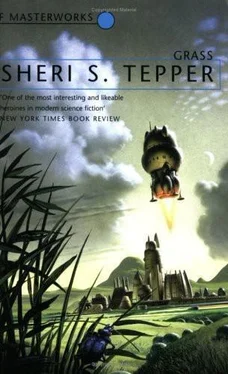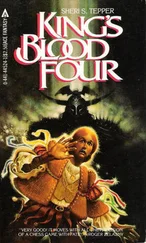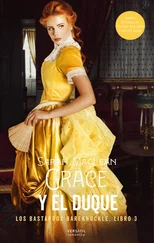Sheri Tepper - Grass
Здесь есть возможность читать онлайн «Sheri Tepper - Grass» весь текст электронной книги совершенно бесплатно (целиком полную версию без сокращений). В некоторых случаях можно слушать аудио, скачать через торрент в формате fb2 и присутствует краткое содержание. Город: London, Год выпуска: 2002, ISBN: 2002, Издательство: Gollancz, Жанр: Фантастика и фэнтези, на английском языке. Описание произведения, (предисловие) а так же отзывы посетителей доступны на портале библиотеки ЛибКат.
- Название:Grass
- Автор:
- Издательство:Gollancz
- Жанр:
- Год:2002
- Город:London
- ISBN:9781857987980
- Рейтинг книги:4 / 5. Голосов: 1
-
Избранное:Добавить в избранное
- Отзывы:
-
Ваша оценка:
- 80
- 1
- 2
- 3
- 4
- 5
Grass: краткое содержание, описание и аннотация
Предлагаем к чтению аннотацию, описание, краткое содержание или предисловие (зависит от того, что написал сам автор книги «Grass»). Если вы не нашли необходимую информацию о книге — напишите в комментариях, мы постараемся отыскать её.
Grass — читать онлайн бесплатно полную книгу (весь текст) целиком
Ниже представлен текст книги, разбитый по страницам. Система сохранения места последней прочитанной страницы, позволяет с удобством читать онлайн бесплатно книгу «Grass», без необходимости каждый раз заново искать на чём Вы остановились. Поставьте закладку, и сможете в любой момент перейти на страницу, на которой закончили чтение.
Интервал:
Закладка:
“Artifacts?” asked Father James.
“Baskets. Plates. Bowls. We do not think they wore fabric, but there are belts, or more properly, sashes. Woven strips of grass fiber about six inches wide and a couple of yards long. Nicely colored, beautifully patterned. The result is much like linen, the experts tell me. The Arbai have few artifacts. It is as though they chose very carefully each thing they used. Chose each one for line or color, what we would call beauty, though many of them — the pots, particularly — do not seem beautiful to us. Perhaps I should say, ‘to me.’ You may find them lovely. Each thing is handmade, but without inscriptions, nothing we might translate as ‘Made by John Brown.’ We will see the artifacts later, Lady Westriding. We have found nothing made by machines and nothing we are sure is a machine. There are the things called the crematoria and the thing in the center of the town. Perhaps they are machines. Perhaps not. And yet, the Arbai traveled. They must have had machines. They must have had ships, and yet we have never found any.”
“Are the towns everywhere like this?” Tony ran his hands along the carving, cupping the time-worn line of an alien face.
“Where there is earth, they built of earth, polymerizing the walls, making vaults or thatching the roofs. Where there are forests, they built of wood. Where there is sufficient stone, they built of stone. Here on Grass the stone comes from a quarry not far distant. The grasses have covered it, but the signs of Arbai work are there, nonetheless. Each city is different, depending upon the materials. On one planet they built high among the trees.”
“Where is that?”
He looked at her as though he had forgotten who she was, trying to remember something, his face intent upon some interior search. “I… I can’t remember. But I know they did…”
“How many of their cities have you seen?” Marjorie asked.
Brother Mainoa chuckled, himself once more. “This one, lady. Only this one. But I have seen pictures of them all. Copies of reports are shared among those of us sentenced to this duty. In case something found in one place casts light on something found elsewhere. Vain hope. And yet we go on hoping.”
“All like this. And all the inhabitants died,” Tony said.
“Perhaps. Or went elsewhere.”
They walked through what might have been a marketplace, or a meeting ground, or even a playground. At the center was the dais Brother Mainoa had described. Upon it an enigmatic strip of material curled and returned upon itself, making a twisted loop through which a tall man might walk. Tony struck it with a knuckle, hearing it ring in response. Metal. And yet it didn’t look like metal. Along the edges were scalloped and indented designs, as though the molten stuff had been imprinted by mysterious fingers. The same designs decorated the edges of the dais. In the open space small flags marked the places bodies had been found, slaughtered in the open, bodies now moved under cover for later study. One flag lay within the looped structure, several others lay beside the dais, as though a gathering had been interrupted there.
“What killed these people?” Tony asked.
“Foxen, some say. I think not.”
“Why do you think not?” Father James was curious, brought out of his usual reticence by the strangeness of this place.
Brother Mainoa looked around him, ignoring the presence of Brother Lourai, but looking for anyone else who might be within earshot. There were no diggers on duty today, but Brothers did drop in from time to time on one errand or another, to make a delivery of foodstuff, to pick up the most recent copies of Arbai books. Some of them were undoubtedly spies for Doctrine.
When he had satisfied himself that no one was listening, Mainoa said, “We Green Brothers have been here for many years, young sir. Many years. Many Grass years. Wintered here, packed up in winter quarters like so many pickles in a jar. We’ve spent every spring and summer and fall among the grasses. In all that time, not one of us has ever been attacked by the foxen.” His tone carried more than conviction. It carried certainty.
“Ah,” said Marjorie. “So.”
The Brother nodded, looking long into her eyes. “Yes, Lady West-riding. So.”
“You mean the Hippae?” Tony asked, appalled. “Surely not!”
“Tony!” Marjorie said emphatically. “Let him say.”
“I have nothing to say.” Brother Mainoa shook his head. “Nothing at all. I would not offend unwilling ears, young sir.”
“Offend my willing ones,” cried Marjorie.
He gave Tony a look which said volumes before turning to Marjorie. The boy flushed.
“To you, madam, then I say this. Look at these poor creatures dead all these centuries. Observe their wounds. Then look among the aristocrats at those who no longer hunt. Look at their artificial hands and arms and legs. And tell me, then, whether that which did the one thing has not also done the other.”
“But the Hippae are herbivores,” Tony protested still, thinking of his father. “Behemoths. Why would they—”
“Who knows what the Hippae do, or are?” offered Brother Mainoa. “They stay far from us, except to watch us. And when they watch us—”
“We see contempt,” breathed Marjorie so quietly that Tony was not sure he had heard her correctly. “We see malice.”
“Malice,” agreed Brother Mainoa. “Oh, at the very least, malice.”
“Oh, come, come,” said Father Sandoval doubtfully, almost angrily. “Malice, Marjorie?”
“I have seen it,” she said, putting her arm around Tony’s slender shoulders “I have seen it, Father. There was no mistake.” She confronted his scolding look with a fierce one of her own. Father Sandoval had always maintained the spiritual supremacy of man. He did not like discussion of other intelligence.
“Malice? In an animal?” asked Father James.
“Why do you say ‘animal’?” asked Brother Mainoa. “Why do you say that, Father?”
“Why… why, because that is what they are.”
“How do you know?”
Father James did not reply. Instead he reached out to help Father Sandoval, who was angrily wiping his brow and looking around him for a place to sit down.
“Over here, Fathers.” Brother Lourai beckoned. “We have made our home in this house of the Arbai. I have something here for us to drink.”
They sat, grateful for the refreshment and the chairs, somewhat disconcerted at the proportions of them. The Arbai had been a long-thighed race. Their chairs did not fit man. At least not these men. They perched, as on stools.
Father James returned to their conversation. “You asked why I thought the Hippae are animals? Well. I have seen them. They show no signs of being more than animals, do they?”
“What kind of sign would you accept?” Brother Mainoa asked. “Tool-making? Burial of the dead? Verbal communication?”
“I don’t know. I haven’t thought about it. Since we’ve been here, I’ve heard no one suggest that the Hippae or the hounds or… or any other animal on Grass was any more than just that.”
Brother Mainoa shrugged “Think about it, Father. Ma’am. I do. It’s an interesting exercise, leading to much fascinating conjecture.”
They shared lunch together, the Brothers’ rations plus the plenty that Marjorie had packed. Then they walked again, down other streets. into other rooms. They saw artifacts. They saw books, endless books, pages covered with curvilinear lines. They came back past the thing on the dais that might be a machine but was definitely represented on at least one door carving, and they went on to see other things that might or might not be machines.
The light began to slant across the trenches, throwing them into shadow. Marjorie shivered as she asked, “Brother, would you come to Opal Hill to meet my husband? He is Roderigo Yrarier, ambassador from Sanctity to this place.”
Читать дальшеИнтервал:
Закладка:
Похожие книги на «Grass»
Представляем Вашему вниманию похожие книги на «Grass» списком для выбора. Мы отобрали схожую по названию и смыслу литературу в надежде предоставить читателям больше вариантов отыскать новые, интересные, ещё непрочитанные произведения.
Обсуждение, отзывы о книге «Grass» и просто собственные мнения читателей. Оставьте ваши комментарии, напишите, что Вы думаете о произведении, его смысле или главных героях. Укажите что конкретно понравилось, а что нет, и почему Вы так считаете.












